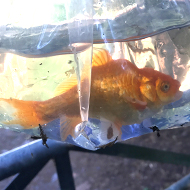
The RSPCA came to the rescue of the lonely fish.
RSPCA Cymru received quite a shock recently when it was called to rescue a goldfish who was stuck 7ft down a well in Newport, Wales.
The goldfish was lucky to have even been noticed, because the property he was found at had been vacant, and was being sold at auction. He may not have been noticed at all, had a member of the public not thought to lift the well cover and take a look inside!
When the member of the public lifted the well cover, they found the goldfish inside, 7ft down and completely alone. They contacted the RSPCA for help, and Inspector Claire Davey attended the scene to rescue him.
Claire said: “We were given permission by the landowner and the estate agents to collect the fish but we have no idea how this little fella got there. It’s a complete mystery!
“The well was 7ft deep and it was quite difficult to catch the little fish and bring him to safety due to the depth and poor visibility but finally I managed to reach him with my reach and rescue pole - after about 30 minutes!
“Who knows what could have happened to this fish if he had not been spotted. It is unlikely that the fish would have survived for long there. I scooped him out and took him to the safety of a tank where he will be looked after until we can find him a lovely new home.”
The RSPCA have offered some tips on caring for goldfish, including:
- make sure you know what space, depth and surface area of water is needed for the number and size of your fish
- find out about what food your fish will eat, and how often and how much they will need it
- get to know your goldfish to help spot signs of something being wrong, and if in doubt, ask your vet.
It is unclear how the goldfish came to be down the well, but he is now being cared for properly until he finds a new forever home.
For more information on the RSCPA, or to support their mission, visit their website at rspca.org.uk/getinvolved



 The latest
The latest